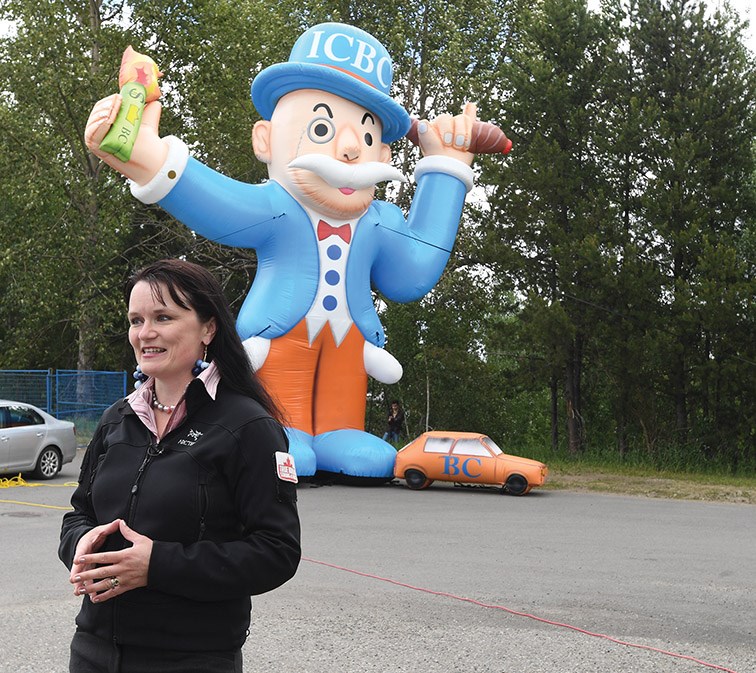With the help of a 30-foot tall mascot, the Canadian Taxpayers Federation took a protest of the provincial government monopoly over vehicle insurance to Prince George this week.
Once inflated, it took on the shape of a Mr. Moneybags figure dubbed Barron von FenderBender by the CTF as a "symbol of this high-cost, no-choice, bloated, nearly insolvent insurance corporation," Kris Sims, the organization's B.C director said.
"If it takes a balloon man bigger and scarier than King Kong to send that message, so be it," she added.
Also recently deployed on the lawn of the B.C. legislature, he wears a powder blue suit jacket, matching the colour used in the Insurance Corporation of British Columbia logo, and a top hat with the ICBC emblazoned across the front along a complimentary orange bow tie and matching pants. He's smoking a cigar and lighting it with burning money.
The CTF also came armed with a study carried out by the Insurance Bureau of Canada that says B.C. drivers pay about 60 percent more for auto insurance than their cousins in Alberta do.
According to the study, a 24-year-old Prince George man who drives his 2010 Ford F-150 to work pays an additional $263, a 45-year-old Langley couple with a learner driver in the family pays $837 more per year to insure their 2012 Honday Accord and a 50-year-old Victoria man pays $771 more to insure his Class C motorhome.
"ICBC's own data shows that while our insurance rates have been jacked up to pay for this bloated monopoly, ICBC staffing levels are skyrocketing, with 124 new managers hired between 2017 and 2018, and executive pay getting boosted too, this is not fair," said Sims. "Have executives at ICBC done such a great job that they deserve bonus pay?"
Speaking on background, a Ministry of Attorney General spokesperson said the CTF is misleading British Columbians about the benefits of an Alberta-style model and that comparing between provinces is difficult because each province has a different system.
"For example, maximum coverage for accident benefits in Alberta is $50,000 while British Columbia's accident benefits coverage has been increased to $300,000," the spokesperson said.
"In Alberta, you can get up to $400 per week for wage loss while in British Columbia you can get almost double that at $740 per week, for crashes after April 1, 2019. Death Benefits in Alberta start at $10,000; while they are three times as much in British Columbia at $30,000."
Additionally, the spokesperson said two reports, one from Saskatchewan using 2016-17 data and one from Manitoba in June 2018, show auto insurance in B.C. to be significantly cheaper, on average, than auto insurance in Alberta or Ontario, the two closest provinces with private insurance.
"While individual experience will vary, the reports show on average savings for British Columbians to be between a few hundred to a few thousand dollars depending on location and driver profile."
The spokesperson also said private insurers and brokers are doing less business or have pulled out of areas of Alberta because government restrictions on rate increases makes it difficult for them to turn a profit.
"This has created a situation where many Alberta residents are driving without insurance. Private insurers are strongly lobbying government to remove the cap."
As well, the spokeperson said B.C. drivers already have choice in purchasing optional auto insurance. Even then, 80 per cent choose ICBC optional insurance because it provides excellent value for money.
"To be clear, ICBC's well-publicized financial challenges stem from record high accident rates, and escalating repair and personal injury costs - not from mismanagement," the spokesperson said.



